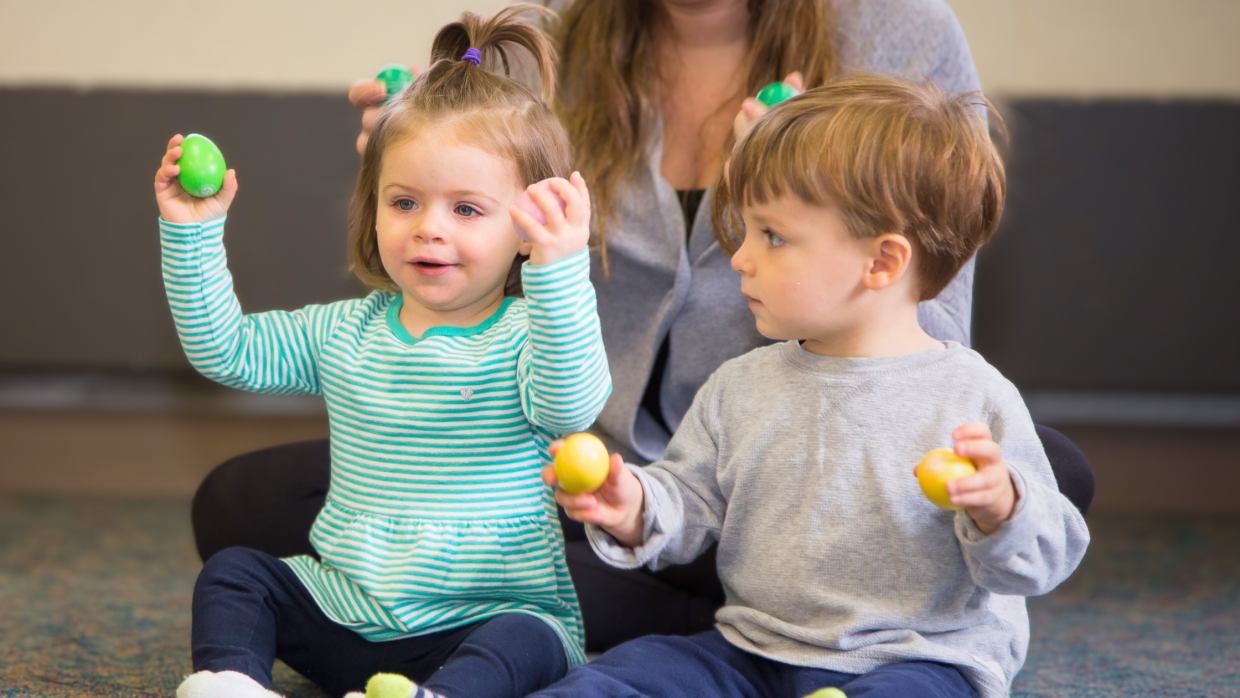The Benefits of Early Childhood Music Classes
Insights from MIC Musikgarten Teacher, Noralyn Baroja

September 9th, 2025
Early childhood is one of the most important times for learning. Music classes for babies and toddlers are more than just another activity, they build skills that support growth in every area of development while creating opportunities to bond with your child in the earliest stages.
From brain development to confidence, social skills, and family connection, early childhood music programs like Musikgarten lay a strong foundation for lifelong learning.
We spoke with Noralyn Baroja, Musikgarten instructor at the Music Institute of Chicago with over 20 years of teaching experience, to learn more about the unique benefits of starting music early.
The Benefits of Early Childhood Music Classes
What Are the Benefits of Early Childhood Music Classes?
Early childhood music classes go far beyond simply singing songs. They support whole-child development by engaging the brain, body, and emotions all at once. Through singing, movement, rhythm, and play, young children practice skills that carry into every area of life.
Benefits of early childhood music classes include:
- Strengthening memory, attention, and problem-solving skills
- Building coordination and fine/gross motor development
- Developing listening skills and focus needed for school
- Encouraging creativity and imagination
- Building a foundation for lifelong learning
“Music stimulates both hemispheres of the brain, enhancing memory, attention, and problem-solving skills that benefit all areas of learning,” shares Noralyn.
Why Is It Important to Start Music Education Before Age 5?
The first five years of life are when children’s brains grow at their fastest pace, forming over one million neural connections per second. Experiences during this period have a lasting impact on how children learn, communicate, and develop.
“Starting music experiences before age five has a profound impact on a child's overall development,” explains Noralyn Baroja. “Most importantly, early exposure sets the stage for future appreciation and a lifelong love of music, even if formal study never occurs.”
Even if families don’t plan for their child to become a musician, early music classes provide skills that support success in school and beyond.
Starting music early helps children:
- Strengthen brain pathways that support problem-solving, language, and memory
- Improve coordination and motor skills
- Build focus, listening, and attention skills that carry over into school readiness
- Develop social-emotional skills like cooperation, confidence, and self-expression
How Music Classes Support Social and Emotional Development in Children
Music is one of the most natural ways for young children to connect with others. Group music classes encourage cooperation, sharing, and self-regulation while building confidence in a group setting.
“Music programs like Musikgarten are highly effective in helping shy or reluctant children open up,” shares Noralyn. “They offer a natural, non-threatening way to encourage self-expression and social interaction. Shy children often feel more comfortable in routines and familiar settings, which reduces anxiety.”
Social and emotional benefits of music classes:
- Learning to take turns, share, and collaborate with peers
- Building self-confidence through singing, movement, and participation
- Strengthening emotional regulation and self-expression
- Deepening parent-child bonding through shared activities
Parental participation also plays a big role. As Noralyn notes, “When parents participate, it provides a secure base for the child, making it easier for them to explore new experiences. Activities such as moving, playing instruments, or echoing sounds give shy children a voice without immediately requiring verbal interaction.”
What Makes Music Classes Different from Other Kids’ Activities?
Parents often wonder: why choose music classes over sports, dance, or other extracurricular programs? Music uniquely supports the whole child, and it’s one of the few experiences that can begin at the very earliest stages of development.
Even before birth, babies respond to music, and once they arrive, programs like Musikgarten welcome them as infants and toddlers, at an age when many other activities like sports or dance aren’t yet accessible.
While children are learning musical skills, Musikgarten goes further by creating a foundation for overall growth. “Musikgarten distinguishes itself from other early childhood programs because it is research-based and designed for the whole child, not just acquiring musical skills,” says Noralyn.
Simple Music Activities to Try at Home
If you’re thinking about introducing your child to music, you can start with simple, playful moments woven into your child’s day to create a more musical home.
Noralyn recommends starting with the basics: “I recommend parents practice maintaining a steady beat at home, as it is the heartbeat of music. Teaching children to feel and maintain a beat helps them become more accurate and confident musicians later on.”
Fun ways to explore music at home include:
- Bouncing, jumping, or swaying in time with music
- Using household items like pots and pans as drums
- Hand clapping games
- Noralyn suggests the game "Where did you find your steady beat today?" in which the child uses everyday objects like a table, couch, or floor to maintain a beat.
"Simply providing a music environment at home prepares a child for future musical studies," she adds.
Musikgarten at the Music Institute of Chicago
Early childhood music classes offer more than an introduction to music. They support cognitive, social, and emotional growth during the years when development happens fastest. With programs like Musikgarten, families can begin fostering these skills from the very start.
Why families choose Musikgarten at the Music Institute of Chicago:
- Comprehensive program for children from birth to age 7 with a clear, sequential learning path
- Research-backed curriculum designed to support early development
- Expert teachers passionate about nurturing each child’s growth
- Convenient locations across Chicagoland
Learn more about Musikgarten® at the Music Institute of Chicago

